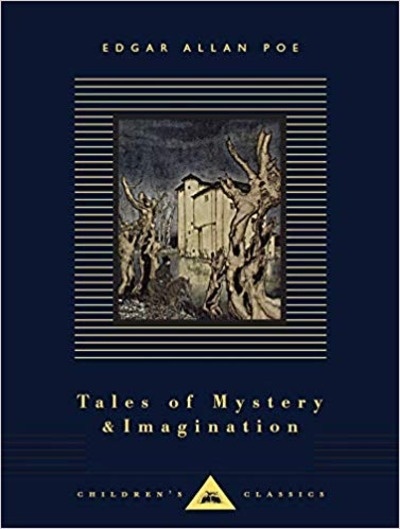Tales of Mystery and Imagination

Editorial Everyman's Children's Classics
Fecha de edición septiembre 2017 · Edición nº 1
Idioma inglés
Ilustrador Rackham, Arthur
EAN 9781857155228
360 páginas
Libro
encuadernado en tapa dura
Dimensiones 165 mm x 210 mm
Resumen del libro
Arthur Rackham (1867-1939) was one of the leading illustrators from the golden age of British book illustration. Fairy-tale and fantasy were his forte and in later life he responded to the dark stimulus of Poe's gothic tales with gleeful appreciation of their macabre and otherworldly qualities, claiming afterwards that he had quite succeeded in frightening himself! For lovers of the thrilling and chilling, young and old, Poe's sensational stories cannot fail to hit the spot. This collection contains the best of his prose works, including of course the well-known masterpieces 'The Fall of the House of Usher' (the ultimate haunted house story), 'The Pit and the Pendulum', 'The Tell-Tale Heart' and 'The Murders in the Rue Morgue' (the very first detective story in fiction).
First published in 1935 it has been redesigned, re-typeset and republished in a handsome edition which features all Rackham's original colour and black and white illustrations.
Biografía del autor
x{0026}lt;P x{0026}lt;B Edgar Allan Poex{0026}lt;/B (1809-1849) quedó huérfano desde muy joven; su padre abandonó a su familia en 1810 y su madre falleció al año siguiente. Tanto su obra como él mismo quedaron marcados por la idea de la muerte, y la estela de la desgracia no dejó de acecharlo durante toda su vida. Antes de cumplir los veinte ya era un bebedor consuetudinario y un jugador empedernido, y contrajo enormes deudas con su padre adoptivo, además de causarle todo tipo de problemas. En 1827 publica x{0026}lt;I Tamerlán y otros poemasx{0026}lt;/I y en 1830 se instala en la casa de una tía que vivía en Baltimore acompañada de su sobrina de once años, Virginia Clemm, con quien se acabaría casando siete años más tarde. Trabajó como redactor en varias revistas de Filadelfia y Nueva York, y en 1849, dos años después de la muerte de su esposa, cae enfermo y fallece preso de la enfermedad y su adicción al alcohol y las drogas. Su producción poética, donde muestra una impecable construcción literaria, y sus ensayos, que se hicieron famosos por su sarcasmo e ingenio, son destellos del talento que lo encumbraría a la posteridad gracias a sus narraciones. Poe, de hecho, es conocido sobre todo por sus relatos y por ser el predecesor, en cierto modo, de la novela policíaca moderna. Sus cuentos destacan por su belleza literaria y por fundir en ellos lo macabro con el humor, el terror y la poesía.x{0026}lt;/P








